Food
+2
precinct14
eddie
6 posters
Page 1 of 2
Page 1 of 2 • 1, 2 
 Food
Food
The Table Comes First by Adam Gopnik - review
A collection of food essays that are done to a turn
Kathryn Hughes
guardian.co.uk, Friday 14 October 2011 22.55 BST

A well-furnished mind: Adam Gopnik. Photograph: Scott Wintrow/Getty Images
Adam Gopnik writes like the longstanding contributor to the New Yorker that he is. Which is to say, he has a voice that is by turns conversational and dandyish, regular Joe and Ivy League, fancy about everyday pleasures (sport, food) and defiantly unawed about those subjects that are supposed to matter more (art, philosophy). Lots of people write, have written, for the New Yorker, and clearly they don't all sound the same – Updike is not Thurber, Dorothy Parker is not Janet Malcolm – but you can't deny a family resemblance. Perhaps it's a confidence thing, a feeling that it is the voice, rather than the subject, that is the point: whether it's Gopnik on Paris, Gopnik on Abraham Lincoln or, as in this new book, Gopnik on food, it is the Gopnik bit that gives what restaurant critics like to call "the sizzle".
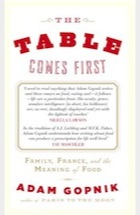
The Table Comes First
by Adam Gopnik
So these are personal essays in the fullest sense of the word, sieving the big subjects of the book's subtitle – family, France, food – through one man's well-furnished mind. They are personal in the more obvious sense, too, of relying on Gopnik's willingness to throw open the doors of his kitchen and allow us to sit down at the family table. Much of the material is drawn from a five-year period when he was living with his wife and two young children in Paris, and cooking for them all.
We hear about the butterscotch he made in honour of his daughter's dog (another Butterscotch), about the wrinkled button noses that greet his rubbing of roast chicken with duck fat, about the three different ways he does rice pudding. There is sentiment here, then, but it is sentiment as it would have been understood in the 18th century, as a flash of strong feeling from which complex moral and intellectual enquiry naturally flows. Gopnik's heroes are Rousseau, Voltaire and Adam Smith and, while you may not have pegged these grands philosophes as handy in the kitchen, Gopnik feels that it is to their large, clear minds we must turn if we want to understand what really goes on when we raise a fork to our lips.
The Table Comes First includes no recipes as such, but what it does have is a lot of dirty cutlery, crumpled napkins and happy, replete Gopniks. It also has letters, like those epistolary narratives so beloved of the late enlightenment. The only difference here is that the person Gopnik is writing to can't write back. She is Elizabeth Pennell, a cookery writer whose 1896 collection The Diary of a Greedy Woman Gopnik likes for its unabashed celebration of appetite. He writes Pennell imaginary emails outlining his failure to make omelettes and the secret to his excellent lime pesto, and they get on swimmingly (probably because she can't write back) until Gopnik discovers something quite horrid. "Lizzie" was an antisemite, particularly nasty about the Russian Jews who moved into the very blocks in Philadelphia where Gopnik's own immigrant grandparents put down roots.
One of Gopnik's chief through-lines in this collection of essays is an enquiry into why high-end restaurant culture has divided so sharply in recent years. On the one hand we have molecular gastronomy, associated in this country with Heston Blumenthal but actually the brainchild of the Spanish chef Ferran Adrià. This is the white lab coat approach to taste manipulation where boundaries of disgust get tested with such perverse mash-ups as parmesan ice-cream and goat-brain tartare with eel. Yet at the same time we have the fetishisation of slow food, a way of cooking that insists on using only the most local and seasonal of ingredients and simmering them in the kind of thick-bottomed pot your imaginary peasant granny might have used.
I'd automatically have put Gopnik in the second camp, a slow food type who goes all giddy at the sight of a potager. But in fact it emerges that he finds all that obsession with soil and roots and purity slightly suspect, in a Lizzie Pennell-ish kind of way. And bogus too. For the reality is that French cookery, like everyone else's, has always been a mixed bag, picking its ingredients from whoever turned up with some coloured beans in their travelling pack.
Gopnik, in fact, turns out to be more at home with the pointy heads. But perhaps what's really important is that he doesn't think that either of these ways of eating – Luddite or test tube – has right on its side, or even actually matters very much. They are both fads, conjured up as much by febrile cultural chatter as by the need to find the right, best, proper way to pack 2,000 calories of protein, starch and fat into the human body every day. And Gopnik knows where the fault lies: with people like him. "Pretending there are patterns when there are really only passing moments is about the only thing writers are good for," he says.
So words come first for Gopnik, before taste, certainly, and sometimes, one might suggest, before substance. His writing here is a high-glazed wonder, as if just the right amount of calf's foot jelly had been dropped into the final mix to make each colour sing out that little bit more strongly. But whether there is an argument to hang on to is not so clear. This is not, for all the cultural name-dropping (apparently Gopnik's mum once made a soufflé for Derrida) a work of philosophical enquiry. It is actually an extended piece of journalism in that fine New Yorker tradition, and all the more pleasurable for it.
Kathryn Hughes's biography of Isabella Beeton is published by Harper Perennial.
A collection of food essays that are done to a turn
Kathryn Hughes
guardian.co.uk, Friday 14 October 2011 22.55 BST

A well-furnished mind: Adam Gopnik. Photograph: Scott Wintrow/Getty Images
Adam Gopnik writes like the longstanding contributor to the New Yorker that he is. Which is to say, he has a voice that is by turns conversational and dandyish, regular Joe and Ivy League, fancy about everyday pleasures (sport, food) and defiantly unawed about those subjects that are supposed to matter more (art, philosophy). Lots of people write, have written, for the New Yorker, and clearly they don't all sound the same – Updike is not Thurber, Dorothy Parker is not Janet Malcolm – but you can't deny a family resemblance. Perhaps it's a confidence thing, a feeling that it is the voice, rather than the subject, that is the point: whether it's Gopnik on Paris, Gopnik on Abraham Lincoln or, as in this new book, Gopnik on food, it is the Gopnik bit that gives what restaurant critics like to call "the sizzle".

The Table Comes First
by Adam Gopnik
So these are personal essays in the fullest sense of the word, sieving the big subjects of the book's subtitle – family, France, food – through one man's well-furnished mind. They are personal in the more obvious sense, too, of relying on Gopnik's willingness to throw open the doors of his kitchen and allow us to sit down at the family table. Much of the material is drawn from a five-year period when he was living with his wife and two young children in Paris, and cooking for them all.
We hear about the butterscotch he made in honour of his daughter's dog (another Butterscotch), about the wrinkled button noses that greet his rubbing of roast chicken with duck fat, about the three different ways he does rice pudding. There is sentiment here, then, but it is sentiment as it would have been understood in the 18th century, as a flash of strong feeling from which complex moral and intellectual enquiry naturally flows. Gopnik's heroes are Rousseau, Voltaire and Adam Smith and, while you may not have pegged these grands philosophes as handy in the kitchen, Gopnik feels that it is to their large, clear minds we must turn if we want to understand what really goes on when we raise a fork to our lips.
The Table Comes First includes no recipes as such, but what it does have is a lot of dirty cutlery, crumpled napkins and happy, replete Gopniks. It also has letters, like those epistolary narratives so beloved of the late enlightenment. The only difference here is that the person Gopnik is writing to can't write back. She is Elizabeth Pennell, a cookery writer whose 1896 collection The Diary of a Greedy Woman Gopnik likes for its unabashed celebration of appetite. He writes Pennell imaginary emails outlining his failure to make omelettes and the secret to his excellent lime pesto, and they get on swimmingly (probably because she can't write back) until Gopnik discovers something quite horrid. "Lizzie" was an antisemite, particularly nasty about the Russian Jews who moved into the very blocks in Philadelphia where Gopnik's own immigrant grandparents put down roots.
One of Gopnik's chief through-lines in this collection of essays is an enquiry into why high-end restaurant culture has divided so sharply in recent years. On the one hand we have molecular gastronomy, associated in this country with Heston Blumenthal but actually the brainchild of the Spanish chef Ferran Adrià. This is the white lab coat approach to taste manipulation where boundaries of disgust get tested with such perverse mash-ups as parmesan ice-cream and goat-brain tartare with eel. Yet at the same time we have the fetishisation of slow food, a way of cooking that insists on using only the most local and seasonal of ingredients and simmering them in the kind of thick-bottomed pot your imaginary peasant granny might have used.
I'd automatically have put Gopnik in the second camp, a slow food type who goes all giddy at the sight of a potager. But in fact it emerges that he finds all that obsession with soil and roots and purity slightly suspect, in a Lizzie Pennell-ish kind of way. And bogus too. For the reality is that French cookery, like everyone else's, has always been a mixed bag, picking its ingredients from whoever turned up with some coloured beans in their travelling pack.
Gopnik, in fact, turns out to be more at home with the pointy heads. But perhaps what's really important is that he doesn't think that either of these ways of eating – Luddite or test tube – has right on its side, or even actually matters very much. They are both fads, conjured up as much by febrile cultural chatter as by the need to find the right, best, proper way to pack 2,000 calories of protein, starch and fat into the human body every day. And Gopnik knows where the fault lies: with people like him. "Pretending there are patterns when there are really only passing moments is about the only thing writers are good for," he says.
So words come first for Gopnik, before taste, certainly, and sometimes, one might suggest, before substance. His writing here is a high-glazed wonder, as if just the right amount of calf's foot jelly had been dropped into the final mix to make each colour sing out that little bit more strongly. But whether there is an argument to hang on to is not so clear. This is not, for all the cultural name-dropping (apparently Gopnik's mum once made a soufflé for Derrida) a work of philosophical enquiry. It is actually an extended piece of journalism in that fine New Yorker tradition, and all the more pleasurable for it.
Kathryn Hughes's biography of Isabella Beeton is published by Harper Perennial.

eddie- The Gap Minder
- Posts : 7840
Join date : 2011-04-11
Age : 68
Location : Desert Island
 Re: Food
Re: Food
AJ Liebling, the great American boxing writer, and a New Yorker regular himself back in the 50's, was also a prodigious gourmand, in both size and appetite. He lived in Paris for several years, and wrote about the experience in a slim little masterpiece, entitled Between Meals. Here he describes the no holds-barred approach of another heroic trencherman, Yves Mirande, patron of one of his favourite Parisian restaurants:
'In the restaurant on the Rue Saint-Augustin, M. Mirande would dazzle his juniors, French and American, by dispatching a lunch of raw bayonne ham and fresh figs, a hot sausage in crust, spindles of filleted pike in a rich rose Sauce Nantua, a leg of lamb larded with anchovies, artichokes on a pedestal of foie gras, and four or five kinds of cheeses, with a good bottle of Bordeaux and one of champagne, after which he would call for the Armagnac and remind Madame to have ready for dinner the larks and ortolans that she had promised him, with a few langoustes and a turbot- and, of course, a fine civet made from the marcassin, or young wild boar, that the lover of the leading lady in his current production (he was also a playwright) had sent up from his estate on the Sologne. "And while I think of it," I once heard him say, "we haven't had any woodcock for days, or truffles baked in the ashes, and the cellar is becoming a disgrace- no more '34s and hardly any '37s. Last week, I had to offer my publisher a bottle that was far too good for him, simply because there was nothing between insulting and the superlative."'
When, as he got older, M.Mirande's appetite failed him for the first time in front of a horrified Liebling, he wrote, 'It was like the moment when I first saw Joe Louis draped on the ropes.' What, were he alive today, would Liebling have made of the pitiless fast food global assault on our taste buds, as inflicted by his country of birth? I suspect not even a Ronald McDonald-inspired lark and ortolan Big Mac would have prevented him from moving back to Paris.
'In the restaurant on the Rue Saint-Augustin, M. Mirande would dazzle his juniors, French and American, by dispatching a lunch of raw bayonne ham and fresh figs, a hot sausage in crust, spindles of filleted pike in a rich rose Sauce Nantua, a leg of lamb larded with anchovies, artichokes on a pedestal of foie gras, and four or five kinds of cheeses, with a good bottle of Bordeaux and one of champagne, after which he would call for the Armagnac and remind Madame to have ready for dinner the larks and ortolans that she had promised him, with a few langoustes and a turbot- and, of course, a fine civet made from the marcassin, or young wild boar, that the lover of the leading lady in his current production (he was also a playwright) had sent up from his estate on the Sologne. "And while I think of it," I once heard him say, "we haven't had any woodcock for days, or truffles baked in the ashes, and the cellar is becoming a disgrace- no more '34s and hardly any '37s. Last week, I had to offer my publisher a bottle that was far too good for him, simply because there was nothing between insulting and the superlative."'
When, as he got older, M.Mirande's appetite failed him for the first time in front of a horrified Liebling, he wrote, 'It was like the moment when I first saw Joe Louis draped on the ropes.' What, were he alive today, would Liebling have made of the pitiless fast food global assault on our taste buds, as inflicted by his country of birth? I suspect not even a Ronald McDonald-inspired lark and ortolan Big Mac would have prevented him from moving back to Paris.

precinct14- Coming up empty from the piggy bank?
- Posts : 297
Join date : 2011-04-13
 Re: Food
Re: Food
^^
That post made me hungry. I loved this bit, "Last week, I had to offer my publisher a bottle that was far too good for him, simply because there was nothing between insulting and the superlative."'
That post made me hungry. I loved this bit, "Last week, I had to offer my publisher a bottle that was far too good for him, simply because there was nothing between insulting and the superlative."'

Nah Ville Sky Chick- Miss Whiplash
- Posts : 580
Join date : 2011-04-11
 Re: Food
Re: Food
This recipe, from Elizabeth David's Summer Cooking, has always stayed with me:
Shooter's Sandwich
The wise, 'at least among the children of this world', to use one of Walter Pater's careful qualifying phrases, travel with a flask of whisky-and-water and what I call a 'Shooter's Sandwich'. This last is made thus: Take a large, thick, excellent rump steak. Do not season it, for that would cause the juice to run out, and in grilling it keep it markedly underdone. Have ready a sandwich loaf one end of which has been cut off and an adequate portion of the contents of which has been removed. Put the steak, hot from the grill, and - but only then- somewhat highly seasoned,into the loaf; add a few grilled mushrooms; replace the deleted end of the loaf; wrap the loaf in a doublesheet of clean white blotting paper, tie with twine both ways, super-impose a sheet of grease-proof paper, and more twine. Place a moderate weight on top, and after a while add other weights. Let the thing endure pressure for at least six hours. Do not carve it until and as each slice is required.
With this 'sandwich' a man may travel from Land's End to Quaker Oats and snap his fingers at both.
From The Dinner Knell (19320, by T.Earle Welby
Shooter's Sandwich
The wise, 'at least among the children of this world', to use one of Walter Pater's careful qualifying phrases, travel with a flask of whisky-and-water and what I call a 'Shooter's Sandwich'. This last is made thus: Take a large, thick, excellent rump steak. Do not season it, for that would cause the juice to run out, and in grilling it keep it markedly underdone. Have ready a sandwich loaf one end of which has been cut off and an adequate portion of the contents of which has been removed. Put the steak, hot from the grill, and - but only then- somewhat highly seasoned,into the loaf; add a few grilled mushrooms; replace the deleted end of the loaf; wrap the loaf in a doublesheet of clean white blotting paper, tie with twine both ways, super-impose a sheet of grease-proof paper, and more twine. Place a moderate weight on top, and after a while add other weights. Let the thing endure pressure for at least six hours. Do not carve it until and as each slice is required.
With this 'sandwich' a man may travel from Land's End to Quaker Oats and snap his fingers at both.
From The Dinner Knell (19320, by T.Earle Welby

precinct14- Coming up empty from the piggy bank?
- Posts : 297
Join date : 2011-04-13
 Re: Food
Re: Food

Felicity's perfect porridge. Photograph: Felicity Cloake
The important thing is that porridge should be creamy in texture (lots of stirring required), but with enough chewy bite to keep it interesting. Toasting brings out the flavour of the oats, and a little milk gives it a silky richness that would horrify puritans north of the border – the sugar situation, however, is up to your conscience.
Per person
¼ cup pinhead oatmeal (about 25g)
¼ cup medium oatmeal (about 25g)
½ cup (about 100ml) whole milk
1 cup (about 200ml) water
Generous pinch of salt
Demerara sugar, golden syrup, chopped dates etc
A little more cold milk, to serve
1. Heat a dry frying pan over a medium high heat and toast the oats until fragrant. Put the oats in a medium saucepan along with the milk and 1 cup (about 200ml) water and bring slowly to the boil, stirring frequently with a spurtle, or the handle of a wooden spoon.
2. Turn down the heat even further, and simmer, stirring very regularly, for about 10 minutes, until you have the consistency you require. After about 5 minutes, add the salt.
3. Cover and allow to sit for 5 minutes, then serve with the toppings of your choice and a moat of cold milk.
Is porridge the ultimate winter breakfast, or a gruel best left in the past? Do you prefer yours basic, austere even, or luxurious – and can anyone suggest some good savoury recipes to rival a Chinese congee?

eddie- The Gap Minder
- Posts : 7840
Join date : 2011-04-11
Age : 68
Location : Desert Island
 Re: Food
Re: Food
Angela Hartnett's sweet potato, smoked mackerel and beetroot recipe
Horseradish is the key to this quick, cheap and tasty recipe
Angela Hartnett
guardian.co.uk, Wednesday 9 November 2011 16.05 GMT
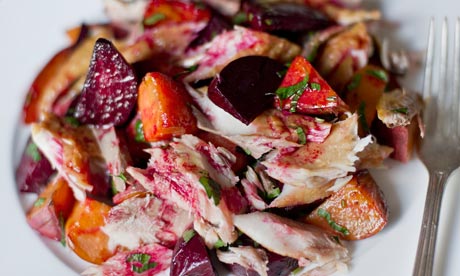
Mackerel is sustainable and very tasty Photograph: Sarah Lee for the Guardian
Smoked mackerel is inexpensive, sustainable and very tasty. It works wonderfully with horseradish, which cuts through the oiliness of the fish, and the sweet potato and slightly pickled beetroot add interestingly balanced flavours.
Most supermarkets do an own-brand smoked mackerel, which is generally good quality – otherwise, get it from your local fishmonger.
Serves 2
2 sweet potatoes, washed and cut into large dice
40ml olive oil
2 garlic cloves, crushed
2 medium beetroots, washed and cut into quarters
2 sprigs of thyme
2 smoked mackerel fillets, flaked
20ml red wine vinegar
2 tsp horseradish cream
1 tbsp chopped, flat-leaf parsley
Preheat your oven to 180C. Take a large baking tray, add a dash of olive oil and place in the oven. When the tray is hot, place the sweet potato and crushed garlic on it, season and cook in the oven for 15 minutes, until soft.
Meanwhile, heat a dash of olive oil in a frying pan, then add the beetroot and thyme.
After four minutes, add the red wine vinegar and 100ml water, cover but keep an eye on it because you may need to add more water. Simmer until the beetroot is cooked (about 15 minutes).
When the beetroot is ready, allow to cool, then mix with the sweet potato and flaked mackerel. Season, finish with the flat leaf parsley, and serve with the horseradish.
• Angela Hartnett is chef patron at Murano restaurant and consults at Whitechapel Gallery and Dining Room, London. @AngelaHartnett
Horseradish is the key to this quick, cheap and tasty recipe
Angela Hartnett
guardian.co.uk, Wednesday 9 November 2011 16.05 GMT

Mackerel is sustainable and very tasty Photograph: Sarah Lee for the Guardian
Smoked mackerel is inexpensive, sustainable and very tasty. It works wonderfully with horseradish, which cuts through the oiliness of the fish, and the sweet potato and slightly pickled beetroot add interestingly balanced flavours.
Most supermarkets do an own-brand smoked mackerel, which is generally good quality – otherwise, get it from your local fishmonger.
Serves 2
2 sweet potatoes, washed and cut into large dice
40ml olive oil
2 garlic cloves, crushed
2 medium beetroots, washed and cut into quarters
2 sprigs of thyme
2 smoked mackerel fillets, flaked
20ml red wine vinegar
2 tsp horseradish cream
1 tbsp chopped, flat-leaf parsley
Preheat your oven to 180C. Take a large baking tray, add a dash of olive oil and place in the oven. When the tray is hot, place the sweet potato and crushed garlic on it, season and cook in the oven for 15 minutes, until soft.
Meanwhile, heat a dash of olive oil in a frying pan, then add the beetroot and thyme.
After four minutes, add the red wine vinegar and 100ml water, cover but keep an eye on it because you may need to add more water. Simmer until the beetroot is cooked (about 15 minutes).
When the beetroot is ready, allow to cool, then mix with the sweet potato and flaked mackerel. Season, finish with the flat leaf parsley, and serve with the horseradish.
• Angela Hartnett is chef patron at Murano restaurant and consults at Whitechapel Gallery and Dining Room, London. @AngelaHartnett

eddie- The Gap Minder
- Posts : 7840
Join date : 2011-04-11
Age : 68
Location : Desert Island
 Re: Food
Re: Food
https://www.youtube.com/watch?v=WPkOv0-u6A0
Monty Python's The Meaning of Life- Mr Creosote dines.
Monty Python's The Meaning of Life- Mr Creosote dines.

eddie- The Gap Minder
- Posts : 7840
Join date : 2011-04-11
Age : 68
Location : Desert Island
 Re: Food
Re: Food
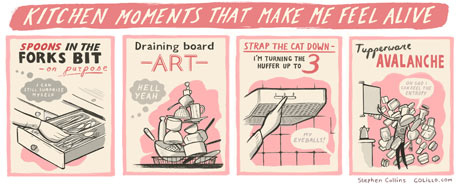
Stephen Collins.

eddie- The Gap Minder
- Posts : 7840
Join date : 2011-04-11
Age : 68
Location : Desert Island
 Re: Food
Re: Food

Berger & Wyse.

eddie- The Gap Minder
- Posts : 7840
Join date : 2011-04-11
Age : 68
Location : Desert Island
 Re: Food
Re: Food
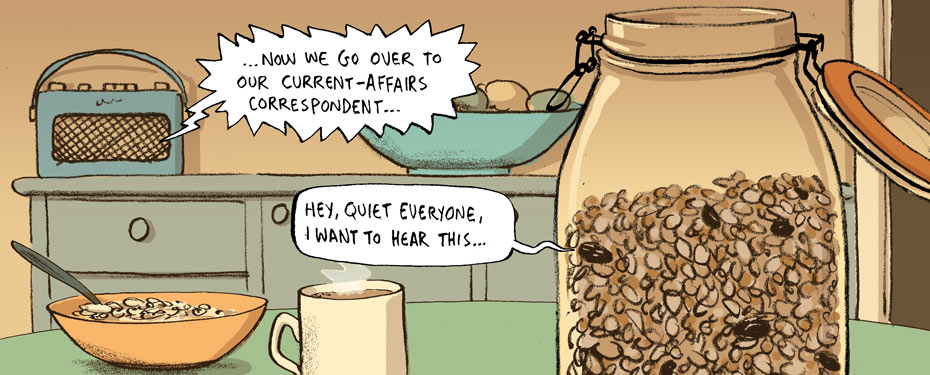
Berger & Wyse

eddie- The Gap Minder
- Posts : 7840
Join date : 2011-04-11
Age : 68
Location : Desert Island
 Re: Food
Re: Food
Tom makes a pot of soup every weekend. Tonight's was lentil with a hambone. He and Elisabeth eat most of it.
Ordinarly I would indulge but I decided to lose weight. I am eating raw carrots, celery, grapefruit (I peel it like an orange) and rice cakes. I lost 10 lbs and have a few more to go.
In the morning I'm ravenous and scarf up two carrots. Kind of pathetic. It takes a long time to chew them.
I'm also drinking a lot of seltzer and hot boullion.
Ordinarly I would indulge but I decided to lose weight. I am eating raw carrots, celery, grapefruit (I peel it like an orange) and rice cakes. I lost 10 lbs and have a few more to go.
In the morning I'm ravenous and scarf up two carrots. Kind of pathetic. It takes a long time to chew them.
I'm also drinking a lot of seltzer and hot boullion.

Constance- Posts : 500
Join date : 2011-04-11
Age : 67
Location : New York City
 Re: Food
Re: Food
Oh yes I also eat a little feta cheese to get some protein in the picture. And I drink vegetable juice and add pepper to it.

Constance- Posts : 500
Join date : 2011-04-11
Age : 67
Location : New York City
 Re: Food
Re: Food
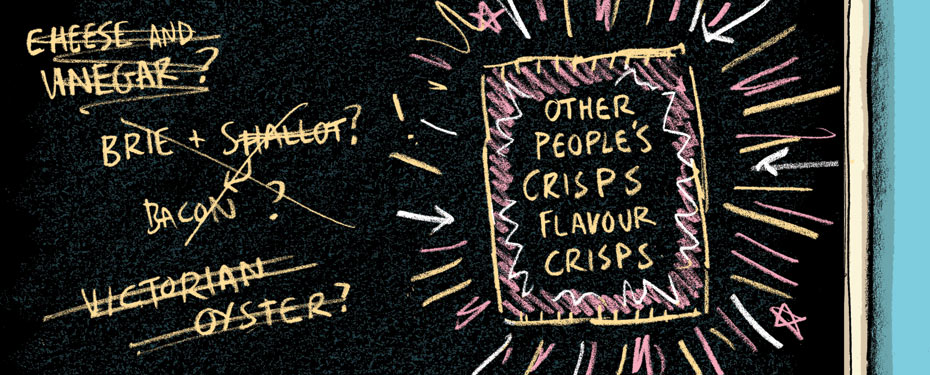
Berger & Wyse.

eddie- The Gap Minder
- Posts : 7840
Join date : 2011-04-11
Age : 68
Location : Desert Island
 Re: Food
Re: Food
Is the food revolution just a great big fat lie?
From the multimillionaire chefs who claim to be just like the rest of us to the multinationals making public health policy, there's something a bit iffy about the new food culture
Eliane Glaser
guardian.co.uk, Friday 2 March 2012 23.01 GMT
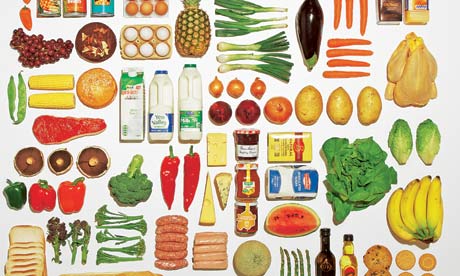
'It’s hard to make good choices when the marketing of products is so opaque and befuddling.' Photograph: Aaron Tilley for the Guardian
In the second half of the 20th century, western consumers were treated to an unprecedented array of high-quality, low-cost food. Monochrome national cuisines were spiced up by immigration, globalisation and holidays abroad. Increased disposable income turned a restaurant pilgrimage into an everyday jaunt. You could have pain au chocolat for breakfast, a Mexican tortilla wrap for lunch and a Thai green curry for dinner. Farmers' markets popularised heritage tomatoes. Celebrity chefs took up residence in gastropubs.

Get Real: How to Tell it Like it is in a World of Illusions
by Eliane Glaser
Now, I think it's great that in recent years we've woken up to the wonders of fresh, local, home-cooked food. But this new food culture is not quite as it seems. The spectacle of Jamie Oliver, a cheeky lad from Essex, tearing basil leaves on to spaghetti was in some ways a step forward for equality, but in other ways it was a sneaky step back – because it made it that much harder to notice the dodgy doublespeak that has come to dominate the way we talk about food.
A lot of celebrity chefs claim to be just like you and me. "I lead a normal life," Nigella Lawson writes in the introduction to Nigella Express, "the sort we all share." So that means living in a £12m house in Chelsea and sharing an estimated fortune of more than £100m with her husband, the art collector Charles Saatchi? Or there's this, from Jamie At Home: "Like most people these days, with a busy family life and a hectic working schedule, I began to struggle with finding a balance between the two. I seem to have evened things up a bit now, and it's all thanks to my veg garden." That would be the veg garden that enjoys the attentions of a personal gardener.
Reality, normality, hard-working families: this is the mantra of the multimillionaire celebrity chef. But the recipes have trouble sticking to it because, despite the homely trappings, they are essentially restaurant food. Take Nigella Express, the book of the TV show promising "fabulous fast food and incredible short cuts". The recipes are quick to make, it's true, but look at the ingredients: mirin, poussin, pomegranate juice, quail, harissa, sake, garlic oil. It would take an afternoon to track them down. I have for many years wrestled with the matter of fresh herbs. They improve simple dishes no end: most of Jamie's 30-Minute Meals rely on them. But I always find myself rummaging impatiently through a supermarket's highly selective herb selection to find the one I need.
Every time I've tried to grow them on my balcony, they've lasted about three weeks. My shrivelled, dried-up herbs seem to me to encapsulate a broader problem, because they are the very baseline minimum of the grow-your-own business, the entry-level stage. And even that doesn't seem to work. The glossy new food revolution that's advertised on our TV screens and in our beautiful recipe books purports to be democratic, accessible, available to everyone, but it's not. I'm fine with Heston Blumenthal's baroque creations, his frog's leg blancmange and exploding cakes. He is not for a minute suggesting that we should try those at home. But if the others really wanted to come up with a quick and easy cookbook for "hard-working families", they'd write one that used only the kind of ingredients I can buy at my local Costcutter: potatoes, tomatoes, onions and carrots.
Yet there's an obsessive emphasis on teachability, on getting your hands dirty, on This Will Change Your Life. I remember recipe programmes on TV in the 80s that paused, politely, while you grabbed a pen to note down the ingredients list. Now, supposedly real-time cookalongs are a frantic marathon, and full ingredients lists are to be found only in the accompanying book, priced at £19.99. And to me it's extraordinary that celebrity cookbooks rarely announce their gastronomical allegiance. A lot of celebrity cheffery blends into a modern European, pan-Asian melange. It's beyond fusion. It's category meltdown. I find it odd that, for all today's flag-waving about the wonder of different cuisines, our modern chefs are so coy about their culinary brand. And for all the apparent kitchen-sink empowerment, I also find it somewhat patronising. These are often connoisseurs who've been trained to distinguish Spanish from Catalan tapas, or trace the genealogy of haute cuisine; but don't you worry your little heads about such finer points, they seem to say. It's the food equivalent of the modern post-ideological politician who gives speeches saying right and left are over, but back at Oxford made damned sure he mastered the taxonomy of political theory. Today's TV chefs claim to be making food accessible, but they don't give ordinary people the vocabulary, the building blocks, to get a handle on food. Just as art schools today don't teach much drawing, there's no going back to food-type basics, techniques or the elements of different cuisines: no culinary periodic table.
Now, you might be thinking, what's wrong with a little recreational food porn? I'm not averse to a bit of Nigella myself. But while these fantasies may be fun, they are not harmless. We lap them up, but they ultimately leave us still more famished. The more time we spend watching cookery programmes and reading restaurant reviews, the less we spend actually cooking. According to the Food Standards Agency, in 1980 the average meal took an hour to prepare. By 1999, it took 20 minutes. And a 2002 Mintel report found that only one in five viewers tries a recipe after watching a chef on TV and only one in seven buys new ingredients. A large proportion of apparently handmade gastropub meals are actually trucked in by catering giants such as Brakes or 3663, which provide microwaveable or boil-in-the bag versions of old-fashioned rustic classics such as venison and pork sausages "infused with sloe gin and served in a rich and sweet bramble berry and red wine sauce", or, for dessert, an "apricot, apple and stem ginger crumble... heaped with hand-placed golden oaty all-butter crumble". The "authenticity" of these dishes is a fib impossible to spot. We may be aware there's been a huge rise in sales of ready meals, but now they're being disguised as home cooking.
My problem is our refusal to admit that reality is obscured by illusory ideals. It's not only that Jamie employs around 5,000 staff and is reportedly worth £65m, it's that he foregrounds his lovely-jubbly persona and rapport with dinner ladies. TV executives try to get around these contradictions with the help of that weasel word "aspirational". But it just doesn't wash. This is not just food. This is 100% mock-authentic, mock-egalitarian class hierarchy. Supermarket labels such as "organic", "finest" and "taste the difference", or "economy", "basics" and "everyday", are euphemisms for food apartheid. I am addicted to the genius TV series Come Dine With Me, but the butt of the jokes are the wannabe foodies in Luton who serve starters of "microsalads", main courses in "towers" on large square plates and desserts that always come as a trio. Jamie's Ministry Of Food claimed to bring home cooking to the ordinary British family, but the series was riddled with undeclared class dynamics. Those mothers who passed chips through the fence at Rawmarsh school in South Yorkshire after it started serving Jamie's healthy school dinners were protesting against paternalism. As one of them explained, "This isn't about us against healthy food, like they've been saying… It's about how people change the rules." I believe Jamie's gastronomical good intentions, but his outrage at seeing mothers bottle-feeding Coke to their babies has a class dimension that is never explicitly addressed. Because he himself doesn't sound posh, there's a sense that if he's made it good, so can they. Jamie raises the stakes for middle-class fans by presenting expensive, cheffy food as barrow-boy basics ("Tear up yer tarragon, drizzle yer top-quality olive oil"). And he raises the stakes for working-class mums by implying that there's no excuse for not pulling themselves up by their culinary bootstraps.
It's not only class inequality that lurks beneath the new food culture, it's gender inequality, too. When Jamie debuted on British TV as The Naked Chef in 1999, he was credited with encouraging the most male-chauvinistic of oafs to try their hand at a fairy cake. And indeed, this has come to pass in some households. But very often it's the men who are flambéeing the bananas at the Saturday night dinner party, while the women are plotting how to stretch the Sunday roast leftovers into day three. Female TV chefs are filmed in a cosy kitchen, male chefs in some kind of rustic outhouse or on a beach with an improvised barbecue. In 2010, Waitrose spent £10m on an advertising campaign featuring two people: "Britain's best chef" and "Our best-loved cook". No prizes for guessing which was Heston Blumenthal and which was Delia Smith.
It's a new backlash sexism, I believe, that accounts for the fact that so many famous chefs' wives are prominent foodies themselves. Their role is to absorb the feminine connotations of their husbands' cookery. "The trick to Christmas," says Tesco Magazine Celebrity Mum of the Year Tana Ramsay, being interviewed for said magazine, "is making things in advance as much as you can, such as chopping the vegetables on Christmas Eve." After the Ramsays have opened their stockings, the article continues, "Gordon and son Jack, eight, whizz off to Claridge's to wish his restaurant staff a merry Christmas. At home, under Tana's watchful guidance, daughters Megan, 10, Holly, eight, and Matilda, six, help their mum keep an eye on the turkey."
The end result is that celebrity chefs and their wives – Tana'n'Gordon, Jamie'n'Jools – end up modelling in the media traditional gender stereotypes that undercut the right-on rhetoric. Take Jools Oliver's Minus Nine To One: The Diary Of An Honest Mum, which contains children's recipes: "A few months before our wedding," she confides in the book, "Jamie asked if I wanted to become his PA. I agreed, as it meant that I would get to see him every day and I thought it would be fun, plus I was never really a career girl anyway. (Who was I kidding? I wanted the babies, the baking and the roses round the door.)" For all the metrosexual class-busting bluster, it's this message we are left with.
My local Waitrose offers a choice of four different kinds of salmon fillet: standard fillets; "Wild Alaskan Sockeye" fillets, "caught in Alaska's well managed, sustainable fishery, certified to Marine Stewardship Council standard"; "Select Farm" fillets from "dedicated farms in locations carefully chosen for their highly oxygenated, fast-flowing tidal waters"; and "Duchy from Waitrose Organic" fillets, "organically farmed to Soil Association standards on Shetland and Orkney". It's a classic example of totally uninformative information. If I were a salmon, I think I'd appreciate highly oxygenated, fast-flowing tidal waters; so how come Duchy from Waitrose organic salmon don't get to swim in them? And how come wild Alaskan salmon are caught in a fishery? That shelf of salmon fillets appeared to offer a diverse range of tasty, affordable, environmentally-friendly fish. But the reality of which kind of fillet would be best for me, best for the fishermen and best for our oceans is simply impossible to make out.
The same goes for seasonal fruit and veg. Seasonality is a virtue heavily promoted by Jamie and the rest. It has the advantage of being an enjoyable virtue, too: I love summery, flavoursome tomatoes and sweet blackberries. But if I go to the supermarket or the local grocer, it's just not that easy to work out what's on nature's menu.
Then there's organic food. The tech spec of organic food – the fact that nothing synthetic is used in its production – suggests flavour, nutritional value and agricultural ethics. But it has become a devalued, mass-market symbolic indicator. Organics are promoted as both available to all and a luxury treat, but often they're more expensive and they taste the same. And they're not even necessarily good for the environment, either. Increasing demand has led to organic meat being raised on vast industrial feed lots, and the scarcity of organic ingredients means they are flown around the world. Research sponsored by the Department for Environment, Food and Rural Affairs showed that the production of a litre of organic milk requires 80% more land than conventional milk. And that organically reared cows burp and fart twice as much methane as conventionally reared cattle, which would be amusing if it weren't for the fact that methane is 20 times more powerful a greenhouse gas than CO2.
Overall, the research on environmental impact is contradictory, which only makes it harder for consumers to work out what to do. The marketing of organic food taps into our innermost drives and ambitions: to be good, to be good to ourselves, to be worth the extra cost. But the only people for whom it definitively seems to be good are managers of multinationals. Ben & Jerry's is owned by Unilever. Coca-Cola has a majority stake in Innocent smoothies. Back To Nature is owned by Kraft. Supermarkets may display their organic food in rustic-looking baskets, and Starbucks may camouflage its corporate brand under local "community personality", but farmers in the developing world suffer from diminishing profits, and our soil, sea and atmosphere are ever more degraded.
The food industry successfully hides its influence behind persuasive talk of the power of the individual. The industry and government alike argue that it is consumer choice and consumer demand that really drive change. Yet a Royal Society report published in 2010 revealed that, although consumers consulted 10 years earlier about whether they wanted GM food had responded with a resounding "no", GM has nevertheless thoroughly penetrated the food supply in the form of soya animal feed and cooking oil. The notion that consumers are in control of the food industry is a myth, as is the notion that they are at liberty to make well-informed decisions about the food they buy. One of the Cornish pasty company Ginsters' favourite slogans is "Keeping it local". But its pasties are taken on a 250-mile round trip by lorry before being delivered to the Tesco next door to its Cornwall plant (they insist it's more efficient that way). A slice of Cranks seeded farmhouse bread has twice the amount of salt as a packet of Walkers ready-salted crisps. McVitie's light digestive biscuits have less fat than McVitie's original digestives, but more sugar, so the difference between the biscuits is just four calories. But then a 2009 article in the New Scientist pointed out that even calorie labelling is unhelpful, because the body digests different foods at different rates. "Consumers aren't stupid" is the stock industry response when challenged on their campaigns of misdirection. Yet in her 2010 book Green Gone Wrong, the environmental writer Heather Rogers quotes the director of an organic conglomerate noting that "most consumers are simple minds [who] look at the label and nothing else". But with labels that are this misleading, intelligence is a red herring.
The industry insists that in selling the sugary, fatty, salty foods that are contributing so much to rates of obesity, heart disease and type 2 diabetes, it is simply giving people what they want. In reality, of course, the industry doesn't just respond to desires: it shapes them. Richard Thaler and Cass Sunstein talk a lot about food choices in their book Nudge: Improving Decisions About Health, Wealth And Happiness. Their proposals, which include placing fruit at eye level in school canteens, are an acknowledgment that people aren't very good at choosing healthy food. They're an acknowledgment, in other words, of the fallacy of the much-trumpeted notion of the rational consumer, although the governments that are in thrall to the politics of nudge seem untroubled by this contradiction. For all their good intentions, Thaler and Sunstein underestimate just how energetically the food industry is working to prevent healthy choices. Often what is needed is some basic information, some rudimentary transparency, rather than a nudge. A traffic light system for labelling healthy and unhealthy food would be a start – research shows it's the most helpful one for consumers – but that would mean giving consumers real power to choose.
One of Tory health secretary Andrew Lansley's first moves in office was to promise that "government and FSA promotion of traffic light labelling will stop" as part of a big shake-up of public health. Out went regulation, legislation and "top-down lectures"; in came voluntary corporate action and individual responsibility. Lansley set up a series of "responsibility deal networks" designed to get public health officials to "work with business". The idea of McDonald's, KFC and Pepsi designing public health policy outdoes Orwell's Nineteen Eighty-Four. And one of the networks, in charge of "public health behaviour change", was to work with the government's newly set up "nudge unit". There it is again, the real payoff of nudge policy: to nudge us into buying from big corporations.
There's a huge denial of inequality here: between consumers and corporations, and also between different kinds of consumers. In reality, there is one group of shoppers that can afford to be ethical and another that can't. The fact is, people on low incomes are more likely to buy food that is bad for them and bad for the environment. But corporations and governments take advantage of the taboos of false consciousness and inequality in order to protest that they are simply letting consumers choose what they want. We are labouring under the delusion not only of freely available, low-cost, great-quality, nutritional food, but also of a level playing field of money, power and information.
The fact that we tolerate this delusional state of affairs does not speak well of us. It makes us seem passive, blinkered and bovine. The cheapness of food has provided us with a false sense of security, allowing us to believe we're getting the best of both worlds. But food prices are rising. In some ways that will make food choices more conscious, and more consciously political. But there's also a danger that we'll focus more attention on price alone. It's not really our fault. It's hard to make good choices when the marketing of products is so opaque and befuddling. It's hard to detect the silent promotion of inequality by mainstream food culture when the headlines are all about democratisation and demographic change. But we are like orally fixated toddlers, transfixed by Nigella's cupcakey bosom, Starbucks' vanilla frappuccinos and Michelin-starred creamy, frothy sauces. We need to wise up to the rhetoric of food and start tasting reality.
This is an edited extract from Get Real: How To Tell It Like It Is In A World of Illusions, by Eliane Glaser, published by Fourth Estate at £14.99.
From the multimillionaire chefs who claim to be just like the rest of us to the multinationals making public health policy, there's something a bit iffy about the new food culture
Eliane Glaser
guardian.co.uk, Friday 2 March 2012 23.01 GMT

'It’s hard to make good choices when the marketing of products is so opaque and befuddling.' Photograph: Aaron Tilley for the Guardian
In the second half of the 20th century, western consumers were treated to an unprecedented array of high-quality, low-cost food. Monochrome national cuisines were spiced up by immigration, globalisation and holidays abroad. Increased disposable income turned a restaurant pilgrimage into an everyday jaunt. You could have pain au chocolat for breakfast, a Mexican tortilla wrap for lunch and a Thai green curry for dinner. Farmers' markets popularised heritage tomatoes. Celebrity chefs took up residence in gastropubs.

Get Real: How to Tell it Like it is in a World of Illusions
by Eliane Glaser
Now, I think it's great that in recent years we've woken up to the wonders of fresh, local, home-cooked food. But this new food culture is not quite as it seems. The spectacle of Jamie Oliver, a cheeky lad from Essex, tearing basil leaves on to spaghetti was in some ways a step forward for equality, but in other ways it was a sneaky step back – because it made it that much harder to notice the dodgy doublespeak that has come to dominate the way we talk about food.
A lot of celebrity chefs claim to be just like you and me. "I lead a normal life," Nigella Lawson writes in the introduction to Nigella Express, "the sort we all share." So that means living in a £12m house in Chelsea and sharing an estimated fortune of more than £100m with her husband, the art collector Charles Saatchi? Or there's this, from Jamie At Home: "Like most people these days, with a busy family life and a hectic working schedule, I began to struggle with finding a balance between the two. I seem to have evened things up a bit now, and it's all thanks to my veg garden." That would be the veg garden that enjoys the attentions of a personal gardener.
Reality, normality, hard-working families: this is the mantra of the multimillionaire celebrity chef. But the recipes have trouble sticking to it because, despite the homely trappings, they are essentially restaurant food. Take Nigella Express, the book of the TV show promising "fabulous fast food and incredible short cuts". The recipes are quick to make, it's true, but look at the ingredients: mirin, poussin, pomegranate juice, quail, harissa, sake, garlic oil. It would take an afternoon to track them down. I have for many years wrestled with the matter of fresh herbs. They improve simple dishes no end: most of Jamie's 30-Minute Meals rely on them. But I always find myself rummaging impatiently through a supermarket's highly selective herb selection to find the one I need.
Every time I've tried to grow them on my balcony, they've lasted about three weeks. My shrivelled, dried-up herbs seem to me to encapsulate a broader problem, because they are the very baseline minimum of the grow-your-own business, the entry-level stage. And even that doesn't seem to work. The glossy new food revolution that's advertised on our TV screens and in our beautiful recipe books purports to be democratic, accessible, available to everyone, but it's not. I'm fine with Heston Blumenthal's baroque creations, his frog's leg blancmange and exploding cakes. He is not for a minute suggesting that we should try those at home. But if the others really wanted to come up with a quick and easy cookbook for "hard-working families", they'd write one that used only the kind of ingredients I can buy at my local Costcutter: potatoes, tomatoes, onions and carrots.
Yet there's an obsessive emphasis on teachability, on getting your hands dirty, on This Will Change Your Life. I remember recipe programmes on TV in the 80s that paused, politely, while you grabbed a pen to note down the ingredients list. Now, supposedly real-time cookalongs are a frantic marathon, and full ingredients lists are to be found only in the accompanying book, priced at £19.99. And to me it's extraordinary that celebrity cookbooks rarely announce their gastronomical allegiance. A lot of celebrity cheffery blends into a modern European, pan-Asian melange. It's beyond fusion. It's category meltdown. I find it odd that, for all today's flag-waving about the wonder of different cuisines, our modern chefs are so coy about their culinary brand. And for all the apparent kitchen-sink empowerment, I also find it somewhat patronising. These are often connoisseurs who've been trained to distinguish Spanish from Catalan tapas, or trace the genealogy of haute cuisine; but don't you worry your little heads about such finer points, they seem to say. It's the food equivalent of the modern post-ideological politician who gives speeches saying right and left are over, but back at Oxford made damned sure he mastered the taxonomy of political theory. Today's TV chefs claim to be making food accessible, but they don't give ordinary people the vocabulary, the building blocks, to get a handle on food. Just as art schools today don't teach much drawing, there's no going back to food-type basics, techniques or the elements of different cuisines: no culinary periodic table.
Now, you might be thinking, what's wrong with a little recreational food porn? I'm not averse to a bit of Nigella myself. But while these fantasies may be fun, they are not harmless. We lap them up, but they ultimately leave us still more famished. The more time we spend watching cookery programmes and reading restaurant reviews, the less we spend actually cooking. According to the Food Standards Agency, in 1980 the average meal took an hour to prepare. By 1999, it took 20 minutes. And a 2002 Mintel report found that only one in five viewers tries a recipe after watching a chef on TV and only one in seven buys new ingredients. A large proportion of apparently handmade gastropub meals are actually trucked in by catering giants such as Brakes or 3663, which provide microwaveable or boil-in-the bag versions of old-fashioned rustic classics such as venison and pork sausages "infused with sloe gin and served in a rich and sweet bramble berry and red wine sauce", or, for dessert, an "apricot, apple and stem ginger crumble... heaped with hand-placed golden oaty all-butter crumble". The "authenticity" of these dishes is a fib impossible to spot. We may be aware there's been a huge rise in sales of ready meals, but now they're being disguised as home cooking.
My problem is our refusal to admit that reality is obscured by illusory ideals. It's not only that Jamie employs around 5,000 staff and is reportedly worth £65m, it's that he foregrounds his lovely-jubbly persona and rapport with dinner ladies. TV executives try to get around these contradictions with the help of that weasel word "aspirational". But it just doesn't wash. This is not just food. This is 100% mock-authentic, mock-egalitarian class hierarchy. Supermarket labels such as "organic", "finest" and "taste the difference", or "economy", "basics" and "everyday", are euphemisms for food apartheid. I am addicted to the genius TV series Come Dine With Me, but the butt of the jokes are the wannabe foodies in Luton who serve starters of "microsalads", main courses in "towers" on large square plates and desserts that always come as a trio. Jamie's Ministry Of Food claimed to bring home cooking to the ordinary British family, but the series was riddled with undeclared class dynamics. Those mothers who passed chips through the fence at Rawmarsh school in South Yorkshire after it started serving Jamie's healthy school dinners were protesting against paternalism. As one of them explained, "This isn't about us against healthy food, like they've been saying… It's about how people change the rules." I believe Jamie's gastronomical good intentions, but his outrage at seeing mothers bottle-feeding Coke to their babies has a class dimension that is never explicitly addressed. Because he himself doesn't sound posh, there's a sense that if he's made it good, so can they. Jamie raises the stakes for middle-class fans by presenting expensive, cheffy food as barrow-boy basics ("Tear up yer tarragon, drizzle yer top-quality olive oil"). And he raises the stakes for working-class mums by implying that there's no excuse for not pulling themselves up by their culinary bootstraps.
It's not only class inequality that lurks beneath the new food culture, it's gender inequality, too. When Jamie debuted on British TV as The Naked Chef in 1999, he was credited with encouraging the most male-chauvinistic of oafs to try their hand at a fairy cake. And indeed, this has come to pass in some households. But very often it's the men who are flambéeing the bananas at the Saturday night dinner party, while the women are plotting how to stretch the Sunday roast leftovers into day three. Female TV chefs are filmed in a cosy kitchen, male chefs in some kind of rustic outhouse or on a beach with an improvised barbecue. In 2010, Waitrose spent £10m on an advertising campaign featuring two people: "Britain's best chef" and "Our best-loved cook". No prizes for guessing which was Heston Blumenthal and which was Delia Smith.
It's a new backlash sexism, I believe, that accounts for the fact that so many famous chefs' wives are prominent foodies themselves. Their role is to absorb the feminine connotations of their husbands' cookery. "The trick to Christmas," says Tesco Magazine Celebrity Mum of the Year Tana Ramsay, being interviewed for said magazine, "is making things in advance as much as you can, such as chopping the vegetables on Christmas Eve." After the Ramsays have opened their stockings, the article continues, "Gordon and son Jack, eight, whizz off to Claridge's to wish his restaurant staff a merry Christmas. At home, under Tana's watchful guidance, daughters Megan, 10, Holly, eight, and Matilda, six, help their mum keep an eye on the turkey."
The end result is that celebrity chefs and their wives – Tana'n'Gordon, Jamie'n'Jools – end up modelling in the media traditional gender stereotypes that undercut the right-on rhetoric. Take Jools Oliver's Minus Nine To One: The Diary Of An Honest Mum, which contains children's recipes: "A few months before our wedding," she confides in the book, "Jamie asked if I wanted to become his PA. I agreed, as it meant that I would get to see him every day and I thought it would be fun, plus I was never really a career girl anyway. (Who was I kidding? I wanted the babies, the baking and the roses round the door.)" For all the metrosexual class-busting bluster, it's this message we are left with.
My local Waitrose offers a choice of four different kinds of salmon fillet: standard fillets; "Wild Alaskan Sockeye" fillets, "caught in Alaska's well managed, sustainable fishery, certified to Marine Stewardship Council standard"; "Select Farm" fillets from "dedicated farms in locations carefully chosen for their highly oxygenated, fast-flowing tidal waters"; and "Duchy from Waitrose Organic" fillets, "organically farmed to Soil Association standards on Shetland and Orkney". It's a classic example of totally uninformative information. If I were a salmon, I think I'd appreciate highly oxygenated, fast-flowing tidal waters; so how come Duchy from Waitrose organic salmon don't get to swim in them? And how come wild Alaskan salmon are caught in a fishery? That shelf of salmon fillets appeared to offer a diverse range of tasty, affordable, environmentally-friendly fish. But the reality of which kind of fillet would be best for me, best for the fishermen and best for our oceans is simply impossible to make out.
The same goes for seasonal fruit and veg. Seasonality is a virtue heavily promoted by Jamie and the rest. It has the advantage of being an enjoyable virtue, too: I love summery, flavoursome tomatoes and sweet blackberries. But if I go to the supermarket or the local grocer, it's just not that easy to work out what's on nature's menu.
Then there's organic food. The tech spec of organic food – the fact that nothing synthetic is used in its production – suggests flavour, nutritional value and agricultural ethics. But it has become a devalued, mass-market symbolic indicator. Organics are promoted as both available to all and a luxury treat, but often they're more expensive and they taste the same. And they're not even necessarily good for the environment, either. Increasing demand has led to organic meat being raised on vast industrial feed lots, and the scarcity of organic ingredients means they are flown around the world. Research sponsored by the Department for Environment, Food and Rural Affairs showed that the production of a litre of organic milk requires 80% more land than conventional milk. And that organically reared cows burp and fart twice as much methane as conventionally reared cattle, which would be amusing if it weren't for the fact that methane is 20 times more powerful a greenhouse gas than CO2.
Overall, the research on environmental impact is contradictory, which only makes it harder for consumers to work out what to do. The marketing of organic food taps into our innermost drives and ambitions: to be good, to be good to ourselves, to be worth the extra cost. But the only people for whom it definitively seems to be good are managers of multinationals. Ben & Jerry's is owned by Unilever. Coca-Cola has a majority stake in Innocent smoothies. Back To Nature is owned by Kraft. Supermarkets may display their organic food in rustic-looking baskets, and Starbucks may camouflage its corporate brand under local "community personality", but farmers in the developing world suffer from diminishing profits, and our soil, sea and atmosphere are ever more degraded.
The food industry successfully hides its influence behind persuasive talk of the power of the individual. The industry and government alike argue that it is consumer choice and consumer demand that really drive change. Yet a Royal Society report published in 2010 revealed that, although consumers consulted 10 years earlier about whether they wanted GM food had responded with a resounding "no", GM has nevertheless thoroughly penetrated the food supply in the form of soya animal feed and cooking oil. The notion that consumers are in control of the food industry is a myth, as is the notion that they are at liberty to make well-informed decisions about the food they buy. One of the Cornish pasty company Ginsters' favourite slogans is "Keeping it local". But its pasties are taken on a 250-mile round trip by lorry before being delivered to the Tesco next door to its Cornwall plant (they insist it's more efficient that way). A slice of Cranks seeded farmhouse bread has twice the amount of salt as a packet of Walkers ready-salted crisps. McVitie's light digestive biscuits have less fat than McVitie's original digestives, but more sugar, so the difference between the biscuits is just four calories. But then a 2009 article in the New Scientist pointed out that even calorie labelling is unhelpful, because the body digests different foods at different rates. "Consumers aren't stupid" is the stock industry response when challenged on their campaigns of misdirection. Yet in her 2010 book Green Gone Wrong, the environmental writer Heather Rogers quotes the director of an organic conglomerate noting that "most consumers are simple minds [who] look at the label and nothing else". But with labels that are this misleading, intelligence is a red herring.
The industry insists that in selling the sugary, fatty, salty foods that are contributing so much to rates of obesity, heart disease and type 2 diabetes, it is simply giving people what they want. In reality, of course, the industry doesn't just respond to desires: it shapes them. Richard Thaler and Cass Sunstein talk a lot about food choices in their book Nudge: Improving Decisions About Health, Wealth And Happiness. Their proposals, which include placing fruit at eye level in school canteens, are an acknowledgment that people aren't very good at choosing healthy food. They're an acknowledgment, in other words, of the fallacy of the much-trumpeted notion of the rational consumer, although the governments that are in thrall to the politics of nudge seem untroubled by this contradiction. For all their good intentions, Thaler and Sunstein underestimate just how energetically the food industry is working to prevent healthy choices. Often what is needed is some basic information, some rudimentary transparency, rather than a nudge. A traffic light system for labelling healthy and unhealthy food would be a start – research shows it's the most helpful one for consumers – but that would mean giving consumers real power to choose.
One of Tory health secretary Andrew Lansley's first moves in office was to promise that "government and FSA promotion of traffic light labelling will stop" as part of a big shake-up of public health. Out went regulation, legislation and "top-down lectures"; in came voluntary corporate action and individual responsibility. Lansley set up a series of "responsibility deal networks" designed to get public health officials to "work with business". The idea of McDonald's, KFC and Pepsi designing public health policy outdoes Orwell's Nineteen Eighty-Four. And one of the networks, in charge of "public health behaviour change", was to work with the government's newly set up "nudge unit". There it is again, the real payoff of nudge policy: to nudge us into buying from big corporations.
There's a huge denial of inequality here: between consumers and corporations, and also between different kinds of consumers. In reality, there is one group of shoppers that can afford to be ethical and another that can't. The fact is, people on low incomes are more likely to buy food that is bad for them and bad for the environment. But corporations and governments take advantage of the taboos of false consciousness and inequality in order to protest that they are simply letting consumers choose what they want. We are labouring under the delusion not only of freely available, low-cost, great-quality, nutritional food, but also of a level playing field of money, power and information.
The fact that we tolerate this delusional state of affairs does not speak well of us. It makes us seem passive, blinkered and bovine. The cheapness of food has provided us with a false sense of security, allowing us to believe we're getting the best of both worlds. But food prices are rising. In some ways that will make food choices more conscious, and more consciously political. But there's also a danger that we'll focus more attention on price alone. It's not really our fault. It's hard to make good choices when the marketing of products is so opaque and befuddling. It's hard to detect the silent promotion of inequality by mainstream food culture when the headlines are all about democratisation and demographic change. But we are like orally fixated toddlers, transfixed by Nigella's cupcakey bosom, Starbucks' vanilla frappuccinos and Michelin-starred creamy, frothy sauces. We need to wise up to the rhetoric of food and start tasting reality.
This is an edited extract from Get Real: How To Tell It Like It Is In A World of Illusions, by Eliane Glaser, published by Fourth Estate at £14.99.

eddie- The Gap Minder
- Posts : 7840
Join date : 2011-04-11
Age : 68
Location : Desert Island
 Re: Food
Re: Food
It would be like saying "one has to be generous... but in moderation"pinhedz wrote:A case can be made for total abstention from coffee.
A case can also be made for habitual coffee drinking.
But no case can be made for drinking coffee in moderation.
The WebMD who always says "Moderation is the key" should be disbarred.
(from the movie "el pisito" https://acrosstheuniverse.forummotion.com/t1284-luis-garcia-berlanga)
Guest- Guest
 Re: Food
Re: Food
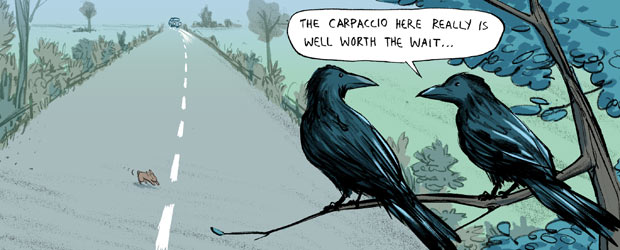
Berger & Wyse

eddie- The Gap Minder
- Posts : 7840
Join date : 2011-04-11
Age : 68
Location : Desert Island
 Re: Food
Re: Food

Chris Riddell

eddie- The Gap Minder
- Posts : 7840
Join date : 2011-04-11
Age : 68
Location : Desert Island
 Re: Food
Re: Food
pinhedz wrote:Are the rumours about a tax on Pasties true?
If they're served hot, yes. Same applies to sausage rolls.

eddie- The Gap Minder
- Posts : 7840
Join date : 2011-04-11
Age : 68
Location : Desert Island
 Re: Food
Re: Food
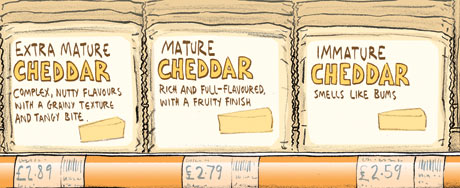
Berger & Wyse

eddie- The Gap Minder
- Posts : 7840
Join date : 2011-04-11
Age : 68
Location : Desert Island
 Re: Food
Re: Food
Jamie Oliver in blistering attack on Michael Gove over poor school diet
The chef and campaigner attacks rules that allow academies to ignore nutrition guidelines
Toby Helm, political editor
The Observer, Sunday 22 April 2012

Jamie Oliver: 'The public health of five million children should not be left to luck or chance.' Photograph: Newspix/Rex Features
Jamie Oliver has made a blistering attack on Michael Gove over school food, claiming that some of the education secretary's flagship academies are lowering nutrition levels among pupils and profiteering from junk food vending machines because they have been allowed to ignore national standards.
The TV chef and food campaigner says the substantial progress made over recent years in improving pupils' diets risks going into reverse because Gove is allowing new waves of academy schools to ignore nutrient-based standards introduced by the last government in 2008.
"I have got nothing against him personally. He is a charming and energetic man," says Oliver, in an interview for today's Observer Food Monthly. "But the health of millions of children could be affected by this one man.
"When there is a national obesity crisis unfolding around us, I honestly think he is playing with fire."
Oliver, who has campaigned for a decade to raise nutrition levels in school food, says he is "totally mystified" as to why headteachers of academies – schools freed from local authority control – are being allowed to determine what food should be on offer, while heads of maintained schools have to abide by the national standards.
"This mantra that we are not going to tell [academy] schools what to do just isn't good enough in the midst of the biggest obesity epidemic ever," says Oliver. "The public health of 5 million children should not be left to luck or chance."
He adds: "We all love headteachers and think they do brilliant work, like nurses and doctors. But they have not been trained to run the biggest restaurant in town, serving 800 meals in one single sitting. They need some expertise and some guidance. It is there. It exists. Why not make it apply to all schools?"
Oliver says that some academies are buying in food that would fail the nutrition tests that maintained schools have to meet. Others are making money from vending machines packed with sweets, crisps and fizzy drinks. Under the national rules, which are applied to other state schools, vending machines can only sell healthy snacks such as fruit, nuts and bottles of water.
Oliver says that large food suppliers have got used to delivering meals to schools that meet the national standards. But now, as the number of academies has increased, they will be less rigorous and cut corners to maximise profits.
Pressure on Gove has also mounted since the Tory MP Zac Goldsmith tabled a Commons motion praising Oliver's campaigning and calling on the secretary of state to amend the regulations "to require academies and free schools to adhere to the standards for school food so that the one million children now attending these schools can benefit from this commitment to their health and wellbeing". The motion has been signed by 54 MPs.
While praising Oliver for the work he has done, Gove insists that academies should not be covered by the national rules because their headteachers can be trusted to deliver the best for their pupils. Last night Lynda Mitchell, the national chair of the of the Local Authority Caterers Association, said she had been told of cases where academies were lowering standards and of cases where vending machines with sweets, crisps and fizzy drinks were being introduced. "It is very worrying. We have clear evidence of this happening," she said, adding that vending machines could be moneyspinners for schools, bringing in profits of £14,000 a year each – enough to pay for a teaching assistant.
A spokesman for the Department for Education said Gove had written to Oliver last year pointing out that "some of the best schools in terms of attitudes to food and meals were academies". Gove also said he had asked the School Food Trust to carry out a survey of food standards in new academies last autumn. It will be published in due course. The spokesman said: "We trust schools to act in the best interests of their pupils. There's been a lasting culture change in attitudes since Jamie's School Dinners. Heads know that failing to invest in good, nutritious food is a false economy and parents won't tolerate reconstituted turkey being put back on the menu."
In his interview, Oliver says he is fed up with hearing about the devolution of power to local level and wants instead to know that ministers are acting to deal with a national crisis. "We don't want bullshit about the big society. We want a strategy to stop Britain being the fifth most unhealthy country in the world. The most unhealthy country in Europe. This is the first generation of kids not expected to live as long as their parents. Tell me, Mr Gove, Mr Lansley [the health secretary], how you plan to change that? Two out of five kids are obese. What is in your arsenal? The fact is, they are doing nothing," he says.
The chef and campaigner attacks rules that allow academies to ignore nutrition guidelines
Toby Helm, political editor
The Observer, Sunday 22 April 2012

Jamie Oliver: 'The public health of five million children should not be left to luck or chance.' Photograph: Newspix/Rex Features
Jamie Oliver has made a blistering attack on Michael Gove over school food, claiming that some of the education secretary's flagship academies are lowering nutrition levels among pupils and profiteering from junk food vending machines because they have been allowed to ignore national standards.
The TV chef and food campaigner says the substantial progress made over recent years in improving pupils' diets risks going into reverse because Gove is allowing new waves of academy schools to ignore nutrient-based standards introduced by the last government in 2008.
"I have got nothing against him personally. He is a charming and energetic man," says Oliver, in an interview for today's Observer Food Monthly. "But the health of millions of children could be affected by this one man.
"When there is a national obesity crisis unfolding around us, I honestly think he is playing with fire."
Oliver, who has campaigned for a decade to raise nutrition levels in school food, says he is "totally mystified" as to why headteachers of academies – schools freed from local authority control – are being allowed to determine what food should be on offer, while heads of maintained schools have to abide by the national standards.
"This mantra that we are not going to tell [academy] schools what to do just isn't good enough in the midst of the biggest obesity epidemic ever," says Oliver. "The public health of 5 million children should not be left to luck or chance."
He adds: "We all love headteachers and think they do brilliant work, like nurses and doctors. But they have not been trained to run the biggest restaurant in town, serving 800 meals in one single sitting. They need some expertise and some guidance. It is there. It exists. Why not make it apply to all schools?"
Oliver says that some academies are buying in food that would fail the nutrition tests that maintained schools have to meet. Others are making money from vending machines packed with sweets, crisps and fizzy drinks. Under the national rules, which are applied to other state schools, vending machines can only sell healthy snacks such as fruit, nuts and bottles of water.
Oliver says that large food suppliers have got used to delivering meals to schools that meet the national standards. But now, as the number of academies has increased, they will be less rigorous and cut corners to maximise profits.
Pressure on Gove has also mounted since the Tory MP Zac Goldsmith tabled a Commons motion praising Oliver's campaigning and calling on the secretary of state to amend the regulations "to require academies and free schools to adhere to the standards for school food so that the one million children now attending these schools can benefit from this commitment to their health and wellbeing". The motion has been signed by 54 MPs.
While praising Oliver for the work he has done, Gove insists that academies should not be covered by the national rules because their headteachers can be trusted to deliver the best for their pupils. Last night Lynda Mitchell, the national chair of the of the Local Authority Caterers Association, said she had been told of cases where academies were lowering standards and of cases where vending machines with sweets, crisps and fizzy drinks were being introduced. "It is very worrying. We have clear evidence of this happening," she said, adding that vending machines could be moneyspinners for schools, bringing in profits of £14,000 a year each – enough to pay for a teaching assistant.
A spokesman for the Department for Education said Gove had written to Oliver last year pointing out that "some of the best schools in terms of attitudes to food and meals were academies". Gove also said he had asked the School Food Trust to carry out a survey of food standards in new academies last autumn. It will be published in due course. The spokesman said: "We trust schools to act in the best interests of their pupils. There's been a lasting culture change in attitudes since Jamie's School Dinners. Heads know that failing to invest in good, nutritious food is a false economy and parents won't tolerate reconstituted turkey being put back on the menu."
In his interview, Oliver says he is fed up with hearing about the devolution of power to local level and wants instead to know that ministers are acting to deal with a national crisis. "We don't want bullshit about the big society. We want a strategy to stop Britain being the fifth most unhealthy country in the world. The most unhealthy country in Europe. This is the first generation of kids not expected to live as long as their parents. Tell me, Mr Gove, Mr Lansley [the health secretary], how you plan to change that? Two out of five kids are obese. What is in your arsenal? The fact is, they are doing nothing," he says.

eddie- The Gap Minder
- Posts : 7840
Join date : 2011-04-11
Age : 68
Location : Desert Island
 Re: Food
Re: Food
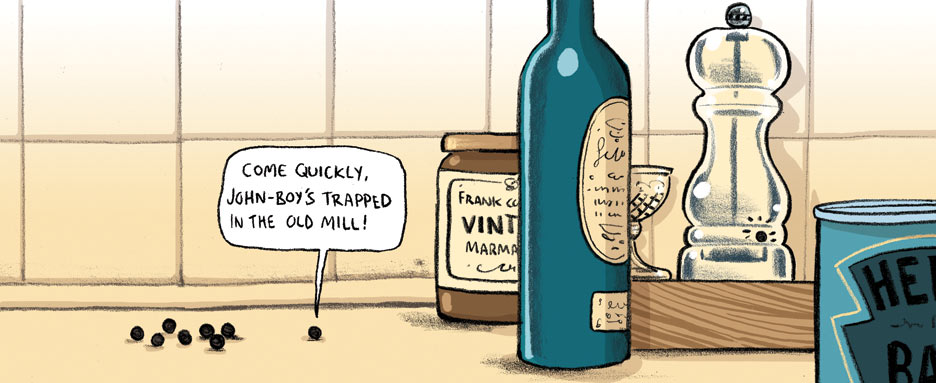
Berger & Wyse

eddie- The Gap Minder
- Posts : 7840
Join date : 2011-04-11
Age : 68
Location : Desert Island
 Re: Food
Re: Food
Big picture: Death Row Prisoners’ Last Meals, by Helen Thompson
From archetypal junk food including pizzas and ice-cream to the gourmet delights of lobster, clams and shrimps, there's an eerie context to these last
suppers. Photographs: Helen Thompson. Words: Hannah Booth
guardian.co.uk, Friday 27 April 2012 16.15 BST
From archetypal junk food including pizzas and ice-cream to the gourmet delights of lobster, clams and shrimps, there's an eerie context to these last
suppers. Photographs: Helen Thompson. Words: Hannah Booth
guardian.co.uk, Friday 27 April 2012 16.15 BST
Last edited by eddie on Sun Apr 29, 2012 2:08 am; edited 1 time in total

eddie- The Gap Minder
- Posts : 7840
Join date : 2011-04-11
Age : 68
Location : Desert Island
 Re: Food
Re: Food

These meals resemble unhealthy school dinners – pizza, nuggets, ice-cream, Pepsi – or photographs in a glossy magazine. It’s only when you learn they are the last suppers of prisoners on death row that they take on a morbid significance.Photograph: Helen Thompson

eddie- The Gap Minder
- Posts : 7840
Join date : 2011-04-11
Age : 68
Location : Desert Island
 Re: Food
Re: Food

Not all are the fast-food blowouts you might expect – triple-murderer Allen Lee Davis chose lobster, fried potatoes, shrimp, clams, garlic bread and root beer in 1999. Photograph: Helen Thompson

eddie- The Gap Minder
- Posts : 7840
Join date : 2011-04-11
Age : 68
Location : Desert Island
 Re: Food
Re: Food

By contrast, Victor Feguer, hanged in 1963 in Iowa, ordered a single olive with the stone in as his final, symbolic meal.Photograph: Helen Thompson

eddie- The Gap Minder
- Posts : 7840
Join date : 2011-04-11
Age : 68
Location : Desert Island
Page 1 of 2 • 1, 2 
Page 1 of 2
Permissions in this forum:
You cannot reply to topics in this forum|
|
|


